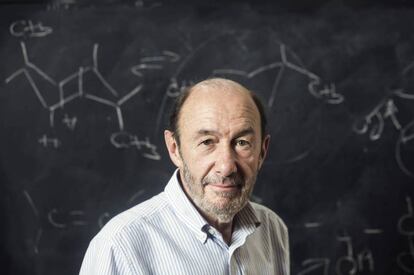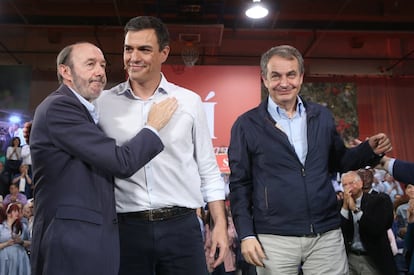Alfredo Pérez Rubalcaba, a key figure in Spanish politics, dies aged 67
The former deputy prime minister in the Socialist Party government of José Luis Rodríguez Zapatero, has passed away in Madrid after suffering a stroke earlier in the week

The former leader of the Spanish Socialist Party (PSOE) and one-time deputy prime minister, Alfredo Pérez Rubalcaba, died today at the age of 67 after suffering a stroke. The veteran politician was taken to hospital in a serious condition on Wednesday afternoon. His condition worsened on Thursday morning, before becoming “extremely serious” according to the Puerta del Hierro hospital in Majadahonda, Madrid. He leaves behind a wife, Pilar Goya. The couple did not have any children.
Pedro Sánchez, the acting prime minister and Rubalcaba’s successor at the head of the party, on Thursday cut short a visit to Romania where an informal EU summit was taking place. The politician took the decision in order to be with the family of his former colleague. Former PSOE Prime Minister Felipe González also canceled an event he had planned for Thursday afternoon, while other PSOE leaders who were outside of Madrid started to return to the Spanish capital as the severity of the former interior minister’s condition became known. Rubalcaba also served on the editorial board of EL PAÍS.
On Friday, Sánchez was due to travel to Barcelona, but at midday, after the weekly Cabinet meeting, he announced that he would be staying in Madrid to monitor Rubalcaba’s progress. “Pedro Sánchez, his government and the entire Socialist family are receiving constant updates about his condition and would once again like to send all of their support and affection to his wife, family and friends,” read a statement from La Moncloa, the seat of Spanish government.
After leaving politics, Rubalcaba went back to his job as a lecturer at Madrid’s Complutense University, where, on Wednesday morning, he gave his classes as usual
Rubalcaba withdrew from the frontline of politics in May 2014, when he resigned as general secretary of the PSOE after the party fared poorly at the European elections. He went back to his former job as a lecturer at the School of Chemistry at Madrid’s Complutense University, where, on Wednesday morning, he gave his classes as usual.
The veteran of Spanish politics studied at the Colegio del Pilar school in Madrid, his family having moved to the capital when he was a young boy. His father, who was an aviator for Franco’s forces during the Civil War, later worked as a pilot for Spanish airline Iberia. During his youth, Rubalcaba was a sprinter, taking part in the 1975 Spanish University Championships, where he ran the 100 meters in under 11 seconds.
A year later, in 1974, he joined the PSOE. He studied Chemical Science at the Madrid Complutense University and in 1978 received a doctorate. He went on to work as a chemistry lecturer at the universities of Constanza (Germany), Montpellier (France) and Madrid’s Complutense.

His political career began with the Madrid Socialist Federation and in Congress, working with the PSOE on education issues. When the PSOE took office in 1982, he took a position within the Secretariat of State for Universities and Research, and in 1985 he became the general director of University Teaching, a role he occupied until the following year, when he was named general secretary for education. In 1988 he became the secretary of state for education.
His political career in the field of education peaked in 1992 when he was appointed minister of education and science.
In 2006, he was named interior minister, managing the ETA ceasefire of March 2006 and the process of bringing an end to the terrorist violence in Spain
In 1993, he was named minister for the prime minister’s office and for relations with Spain’s houses of parliament. That same year, he won a seat in Congress at the general elections, a victory he repeated in 1996, despite the PSOE losing at the polls to the conservative Popular Party (PP).
From that point on his political career took off. In 1997 he was appointed a member of the PSOE national executive committee, and in 2000, when the PSOE chose future Prime Minister José Luis Rodríguez Zapatero as general secretary, Rubalcaba joined the electoral committee for the 2004 general elections.
At those polls, which were won by the Socialists, Rubalcaba again won a seat in Congress and was appointed spokesperson for the party in Congress. He is remembered for a statement he uttered on the day before the elections, which are characterized in Spain as a “day of reflection” without campaigning. “Spanish citizens deserve a government that doesn’t lie to them,” he said, in reference to the then-PP government’s insistence that the Atocha train bombings, which had taken place just days before, on March 11, were the work of Basque terrorist group ETA and not, as it later emerged, an Al-Qaeda-inspired cell.
During the term that followed, he played a key role in the government’s efforts to implement its policies, such as the reform of the Catalan statute, the piece of legislation covering the northeastern region’s autonomous powers. That was approved in 2006 after arduous negotiations, and in a climate of open conflict with the PP, which viewed Rubalcaba as one of its main political rivals. The PP blamed the PSOE politician for having encouraged the demonstrations that were held outside its headquarters ahead of the 2004 elections over the Madrid bombings, and of the accusations of lying about the terrorist atrocity.
Politics is more hostile than ever, but not so much due to its proponents or external factors, but due to its own inbreeding and self-destructive mechanisms Alfredo Pérez Rubalcaba
In 2006, he was named interior minister, managing the ETA ceasefire of March 2006 and the process of bringing an end to the terrorist violence in Spain. The truce came to an abrupt end, however, when the Basque terrorist group detonated bombs in the parking lot at Madrid Barajas airport, killing two people.
Several months later, Rubalcaba took the personal decision to grant concessions to ETA convict José Ignacio de Juana Chaos after a 114-day hunger strike “for legal and humanitarian reasons to avoid a death.” The move was controversial politically and led to further criticism for the Socialist minister.
After the PSOE won the 2008 elections, Rubalcaba once again took a seat in Congress and continued at the head of the Interior Ministry. The counter-terrorist fight continued with a number of arrests of ETA members, in particular from their leadership. In 2010 the politician was named deputy prime minister, retaining his role as interior minister and also acting as government spokesperson.
In 2011, he was designated the successor of Zapatero and ran as candidate for prime minister at the general election that year. After losing out to the PP – the party went from 169 to 110 seats in Congress – he ran for leadership of the PSOE at a congress held in February 2012, where his opponent was Carme Chacón. He beat out the former defense minister by just 22 votes (497 vs. 465).
The poor election results, combined with the loss of nine MEPs at the European elections of 2014, prompted the party to call an extraordinary congress, at which Rubalcaba opted not to stand. He announced that he would be leaving the frontline of politics, abandoning his seat in Congress in September 2014. He returned to his former job at the Complutense University, while continuing to work with his party and attending some campaign events. In December 2018, Pedro Sánchez sounded out Rubalcaba about running for Madrid mayor, but he turned down the proposal.
Speaking about politics in 2018, he told EL PAÍS that “politics is more hostile than ever, but not so much due to its proponents or external factors, but due to its own inbreeding and self-destructive mechanisms. It’s dog-eat-dog. There is a toll that is more difficult than any other: the personal burnout, and that of your environment, your people, your family. When I said goodbye at the last rally in Solares, my cousin, who is completely outside politics, said to me: ‘You have no idea how hard it has been all these years having the surname Rubalcaba’.”
English version by Simon Hunter.
Tu suscripción se está usando en otro dispositivo
¿Quieres añadir otro usuario a tu suscripción?
Si continúas leyendo en este dispositivo, no se podrá leer en el otro.
FlechaTu suscripción se está usando en otro dispositivo y solo puedes acceder a EL PAÍS desde un dispositivo a la vez.
Si quieres compartir tu cuenta, cambia tu suscripción a la modalidad Premium, así podrás añadir otro usuario. Cada uno accederá con su propia cuenta de email, lo que os permitirá personalizar vuestra experiencia en EL PAÍS.
¿Tienes una suscripción de empresa? Accede aquí para contratar más cuentas.
En el caso de no saber quién está usando tu cuenta, te recomendamos cambiar tu contraseña aquí.
Si decides continuar compartiendo tu cuenta, este mensaje se mostrará en tu dispositivo y en el de la otra persona que está usando tu cuenta de forma indefinida, afectando a tu experiencia de lectura. Puedes consultar aquí los términos y condiciones de la suscripción digital.









































